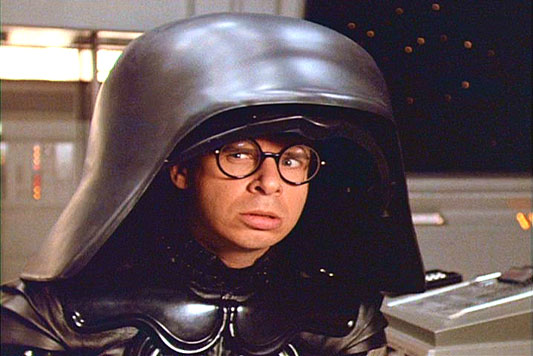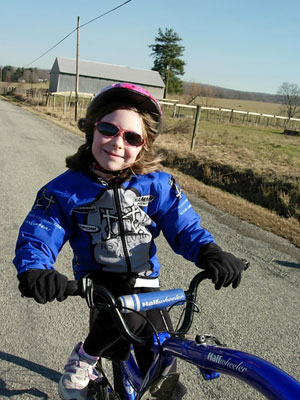There is no such thing as a boring bicycle ride when you’re towing a child. In various combinations of tandems and trailers, I’ve taken my kids along for some of the best rides of my life, and yet I still can’t figure out exactly why I do this. Kids make everything more difficult, and cycling is no exception. Almost the entire point of a longer mountain or road ride is to leave life’s obligations, including the kids, behind. As anti-social behavior goes, attaching the little creature you’re supposed to love and protect at all costs to a bicycle and venturing out into a world of jagged rocks or blaring car horns requires a contempt for civilized society normally reserved for rock stars and the criminally insane.

First, there’s the equipment: there is no way to infuse one of these rides with Rapha-like panache. Kids’ helmets all tend to be just a little bit insulting. I’d owned a bike shop for a long time, so at least my kids all ended up finding the smallest versions of helmets made for adults–slightly more tasteful black and gray things without any cartoon cats or blue flames–but still, kids in helmets all tend to have a certain look.

On our recent ride, my son Baden wore his custom dryer-shrunk Garneau gloves first inside out, then upside down, before finally settling on simply “on the wrong hands.” I didn’t bother correcting this last one, as they actually seemed to fit better with the thumbs sticking out of the pinkie holes.
At any rate, you and your child, or whatever child you’ve borrowed for the occasion, are going to look ridiculous. Own that ridiculousness. Its stench will distract passers by from the slightly funkier stink of your gross negligence as a caregiver.
Still sketchier than the uniform are the devices that carry kids. While I have deep respect for the “high center of gravity and long way down” variety, I’ve always opted for trailers, and my personal favorite: the half-bike. Variously known also as the “trailer bike” or “half-wheeler,” half-bikes are basically a bike with a boom and angry-looking clamp in place of a proper fork and front wheel. Giant manufactured the particular one I use sometime around 2005, the year my daughter became old enough to grip handlebars and scream “car back!”

It has most of the parts that would make is an otherwise horrible little bicycle–a garbage shifter and a pot metal rear derailleur, along with a giant metal clamp seemingly designed for crushing any modern seat post. (Fortunately, I’ve used several different high quality alloy seat posts from Thomson, Ritchey, and RaceFace, and have rarely completed a ride without the child still attached.)
In the interest of looking ridiculous enough to blind both uneducated onlookers as well as seasoned cycling professionals to my flamboyant negligence as a father, I’ve towed a double trailer with a bright green tandem; routinely picked a kid up from school towing a half-bike on a hipster fixie; and towed a kid on a half-bike which in turn was towing a trailer with two other kids, while riding a Moots road bike with carbon rims. Come to think of it, I might’ve had a carbon stem on the bike at that time, too.
But why? Why go to such lengths to include a kid, or two, or three? For many years, my theory was this: guilt.
Having grown up properly Catholic and thus with a crushing sense of guilt in all things remotely enjoyable, when our daughter was born I somehow convinced myself that the only way I could go do longer road and mountain rides guilt-free, was to take my five-year-old daughter with me. Fueled by guilt and my desire to be on a bicycle and still be a dad, my daughter and I had adventures, including a 35-mile mountain bike ride, a pre-ride on the hairy Seven Springs race course, and an attempt to outrun a dog (fail) that eventually caught us (and bit me). We also slogged up a lot of climbs, including, one summer day, a local climb called Snowball Hill. My memory is still cloudy, and hopefully my daughter repressed the whole thing (I’m pretty sure all my mantras turned to profanity before the first third of the climb had finished turning my legs to jello), but I do remember having trouble keeping the front of the bike down even while standing, having to consciously weight the rear wheel the way I would a mountain bike climb, because the rear tire was squeaking and spinning, and a foot exploding out of my pedal like a bottle rocket and very nearly sending my throbbing knee right into my chin.
It was that climb, more than anything, that first started to put things into perspective for me. Guilt and obligation were playing some sort of enormous role in everything I did. They’d motivated me to build a successful business, but one that was made of fourteen-hour work days and no vacation in over a decade. Here was something significantly wrong with my life, and, though I recognized it that day–and probably every day–it would still take me five years to sell the company, nearly kill myself in an uphill battle to keep it alive under the new ownership, grow painfully disillusioned, and finally walk away. I quit. Having relocated to Chicago to oversee the company for the new owners, I made the long drive home to my family in Pennsylvania, broken but happy. For fourteen years, each day had handed me an absurd list of challenges and dared me to blink. Now I had, and there was a kind of dizzying freedom in that. I had been doing what I thought I was supposed to do as a husband and a father, even though it was keeping me from being both.
So there must have been a certain look on my face when one of my twin boys, Baden, declared–seemingly out of the blue–that he wanted to ride up Snowball Hill with me today, like I had with Riley years ago.
My wife was at work, my daughter was in Montana with my in-laws, and my other son was at a party. I could have left Baden at the party, too, and done a perfectly enjoyable ride all by myself like any red-blooded American Male, but Baden wanted to try to ride up Snowball Hill together, and something other than guilt seemed to be driving me to smile and nod. I wanted to see if we could do it.
As omens go, before we’d made it anywhere near the climb, a sudden weight shift from Baden as a truck passed us had hauled me off the shoulder of the road and into a gravel rain gutter, which we rode for a while (the decision to go with the ‘cross bike instead of a full-on road bike was looking wise) before I could get the whole contraption stopped. There followed one of the weirdest moments in my life. Both legs and hands still visibly trembling from the “incident,” I proceeded to deliver a speech about road etiquette that quickly turned into a tangled mess of memories. When you hear a car coming, don’t turn around to look at it. Here I was once again explaining that. Here I was in that moment with one of my kids. An odd mix of calm mingled with the twitching terror still dancing around in my legs and arms. The cumulative effect being witnessed by passing motorists probably resembled an interpretive dance expressing a nervous breakdown, but I was riding a bike with one of my kids, and I was having a good time.
I am not, like Sting or the men in infomercials, more fit at 40 than I was at 25. And I wasn’t very fit at 25. As I remembered it, Snowball Hill was made up of three tiers. A long, grinding initial slog under a canopy of oaks and maples emptied out of the trees into a stretch of bleached pavement that looked almost vertical in the distance. As we cleared the last rise of the first section and saw the next climb on the road ahead, my son said, “I looks like somebody put pavement up a building.” It was such a horrible thing to be spoken at that point that I actually started laughing. He also asked if that was the end, and of course, it wasn’t. Beyond that I knew one last kicker was waiting to cut short any celebration. Taken alone, the last twisting left-hand climb wouldn’t have been so bad, but, following the first two sections, the last kick upward was also a beast. There was a cemetery on the right of the last section, which always seemed convenient.

We put in a valiant effort, but in the end we had to stop almost exactly where I’d been forced to stop with my daughter Riley years ago. And just like then, I was somehow able to get started up again by cutting diagonally across the road to build speed then yelling for Baden to lean into the hill and carving back into a straight climb up it again. I gave up trying to control my breathing and went with more of a dying Shakespearean villain sound that could probably be heard for quite a distance. All the while, Baden was talking, explaining some complex geometric principle at play in the design of Legos. There was only a brief moment of quiet in the middle of my breathing process where I could actually hear him, but I could tell that he was talking non-stop. I imagined him still talking, even if I fell off the bike and rolled slowly back down the hill. He’d roll into the grass on the side of the road the way I’d shown him in case we ever wrecked, struggle to drag our mess of bikes off the road as best he could, and then start walking back down the hill to finish telling me something.
It hit me then that there was something other than guilt at work here. I loved this. I was happier with him there at that moment than I would have been alone–happier even than I would have been with friends. I was standing, trying to keep the mad swaying of the half-bike under control, trying to keep the front of my bike down, and trying to keep my revolutions from slowing to a complete stall, but I was genuinely happy. I was happy because Baden was happy, and because it was a beautiful day, and because we were alive, and my son Beckett, frozen in the air with a look of wild abandon just above the surface of a swimming pool, was alive, and my daughter, watching mountain goats through binoculars in Glacier National Park, was alive. Even if we all wouldn’t be like that forever, we were right then, and I wanted to be towing all of them up that hill while they talked about Legos, and lizards, and books they’d read. “Dad,” Baden said, expecting a conversational response in that way he has of being completely oblivious to the severity of a situation, and I loved him for it. It might’ve just been the lack of oxygen, but for a moment there, I wanted the climb to just keep going.
